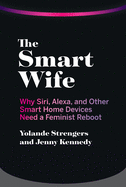
These days a key phrase such as "Siri," "Alexa" or "Okay, Google" can launch a helpful, usually feminized, voiced assistant ready to answer any question. Other smart devices, such as robot vacuums and refrigerators, can be connected to the Internet of Things and are slowly becoming more ubiquitous. But, as technology and communications researchers Yolande Strengers and Jenny Kennedy observe, there is a pattern of assigning genders to such assistance, and this flags some concern about how, even with digital aids, work itself is still rendered in ways that devalue feminized labor.
From domestic tasks to emotional labor to sex, there is a push to provide non-human solutions, so that everyone might have a "smart wife" without questioning what it is that a "wife" does in the first place. Strengers and Kennedy consider how this construction reiterates sexist, patriarchal messaging by basing the purpose of digital devices, intentionally or not, on the white, middle-class, heteronormative, housework- and homemaking-focused 1950s housewife. They note, "Smart wives hark back to nostalgic stereotypes that people are now being told (through smart tech marketing) that they deserve and should desire. Sure, overtly gendered smart wives are familiar, cute, sexy, friendly, and 'easy to use'--but at what cost to society?"
Their book attempts not only to examine the various costs to society, but also to provide an alternative. In their fascinating "manifesta," they aim to "reboot" how society might reconfigure its relationship to smart devices "without the encumbrance of outdated traditions." As such, gender-progressive practices might be more fully realized in a more digital age, and more ethically, too. --Michelle Anya Anjirbag, freelance reviewer

